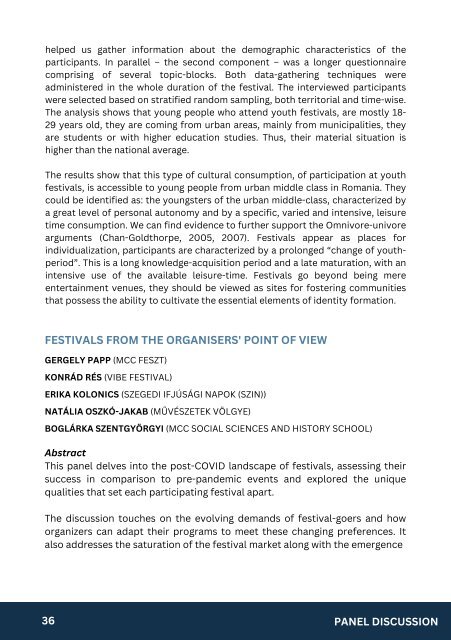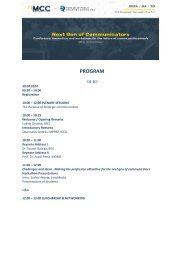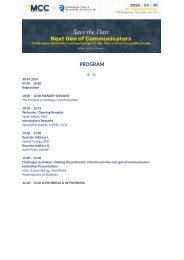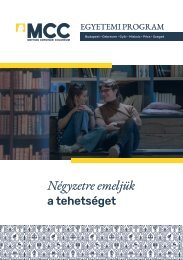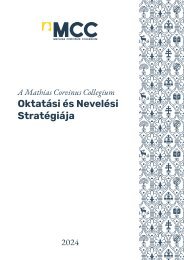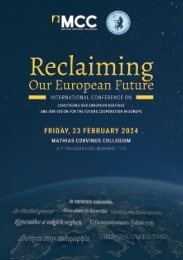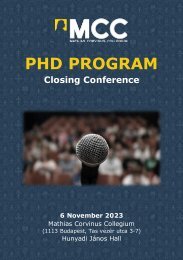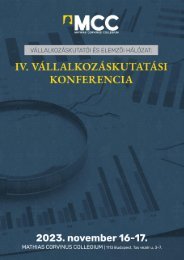Clout Culture - Youth Cultures in Changing Societes Conference
Create successful ePaper yourself
Turn your PDF publications into a flip-book with our unique Google optimized e-Paper software.
helped us gather <strong>in</strong>formation about the demographic characteristics of the<br />
participants. In parallel – the second component – was a longer questionnaire<br />
compris<strong>in</strong>g of several topic-blocks. Both data-gather<strong>in</strong>g techniques were<br />
adm<strong>in</strong>istered <strong>in</strong> the whole duration of the festival. The <strong>in</strong>terviewed participants<br />
were selected based on stratified random sampl<strong>in</strong>g, both territorial and time-wise.<br />
The analysis shows that young people who attend youth festivals, are mostly 18-<br />
29 years old, they are com<strong>in</strong>g from urban areas, ma<strong>in</strong>ly from municipalities, they<br />
are students or with higher education studies. Thus, their material situation is<br />
higher than the national average.<br />
The results show that this type of cultural consumption, of participation at youth<br />
festivals, is accessible to young people from urban middle class <strong>in</strong> Romania. They<br />
could be identified as: the youngsters of the urban middle-class, characterized by<br />
a great level of personal autonomy and by a specific, varied and <strong>in</strong>tensive, leisure<br />
time consumption. We can f<strong>in</strong>d evidence to further support the Omnivore-univore<br />
arguments (Chan-Goldthorpe, 2005, 2007). Festivals appear as places for<br />
<strong>in</strong>dividualization, participants are characterized by a prolonged “change of youthperiod”.<br />
This is a long knowledge-acquisition period and a late maturation, with an<br />
<strong>in</strong>tensive use of the available leisure-time. Festivals go beyond be<strong>in</strong>g mere<br />
enterta<strong>in</strong>ment venues, they should be viewed as sites for foster<strong>in</strong>g communities<br />
that possess the ability to cultivate the essential elements of identity formation.<br />
FESTIVALS FROM THE ORGANISERS' POINT OF VIEW<br />
GERGELY PAPP (MCC FESZT)<br />
KONRÁD RÉS (VIBE FESTIVAL)<br />
ERIKA KOLONICS (SZEGEDI IFJÚSÁGI NAPOK (SZIN))<br />
NATÁLIA OSZKÓ-JAKAB (MŰVÉSZETEK VÖLGYE)<br />
BOGLÁRKA SZENTGYÖRGYI (MCC SOCIAL SCIENCES AND HISTORY SCHOOL)<br />
Abstract<br />
This panel delves <strong>in</strong>to the post-COVID landscape of festivals, assess<strong>in</strong>g their<br />
success <strong>in</strong> comparison to pre-pandemic events and explored the unique<br />
qualities that set each participat<strong>in</strong>g festival apart.<br />
The discussion touches on the evolv<strong>in</strong>g demands of festival-goers and how<br />
organizers can adapt their programs to meet these chang<strong>in</strong>g preferences. It<br />
also addresses the saturation of the festival market along with the emergence<br />
36<br />
PANEL DISCUSSION


